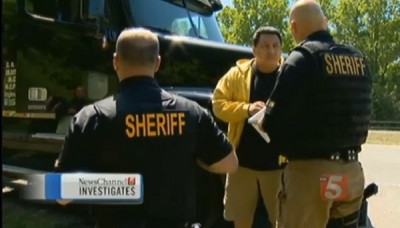 Driving with large amounts of cash is now a crime in Tennessee – at least if recent events are any indication.
Driving with large amounts of cash is now a crime in Tennessee – at least if recent events are any indication.
The seizure of cash from citizens under civil forfeiture laws in Tennessee has gotten so out of control that the state legislature is looking into the practice. Members of drug task forces turned police traffic stops into shakedowns that seized hundreds of thousands of dollars in cash from motorists, testimony before state legislators revealed.
The legislative hearings were prompted by an investigation by Channel 5, a Nashville TV station, that found members of a drug task force were more interested in seizing cash from travelers than arresting drug smugglers.
“What’s wrong about having large amounts of cash?” businessman Karen Petrosyan asked.
Petrosyan claims that the members of 21st Judicial District Drug Taskforce seized $200,000 and a tractor trailer he owned on Interstate 40 near Carthage, Tennessee. Petrosyan did not have drugs. Federal and state laws let police seize any cash they suspect of being drug-related — without a warrant.
In some instances, people never get their money back, because it would cost more in attorney’s fees to acquire it than it’s worth.
Interstate highway now a profit center for police
“Interstate 40 has become a major profit center for Tennessee law enforcement,” said Phil Williams, Channel 5’s chief investigative reporter. Williams found that law enforcement agencies were actually competing to seize cash from travelers.
Some of the disturbing behavior Williams discovered included:
- Seizure along I-40 has become so profitable that turf wars have broken out between two rival drug task forces — the 23rd Judicial District Drug Taskforce and the Dixon Interdiction Enforcement (DICE). The station had video of officers trying to cut members of the rival task force off so that they could stop vehicles and search for cash.
- When Channel 5’s crew visited the stretch of I-40 patrolled by the task forces, it discovered that the drug task force vehicles sitting on the highway were facing the west-bound lanes. The west-bound lanes are where smugglers haul drug cash back to Mexico. The task force members were apparently ignoring the east-bound lanes, where vehicles haul drugs to markets on the East Coast. They wanted cash, not drugs.
- A review of 21st Judicial District Drug Task force records showed that officers made 10 times as many stops on the west-bound side of the highway as on the east-bound side.
- Officers on the task forces might lose their jobs if they don’t seize lots of cash, Ricky Chandler, the police chief in Dickson, Tennessee, told Williams. Chandler organized DICE and helps lead it. He admitted that DICE is paid for by seizure money.
“Everything’s paid for through seizures and fines,” Chandler admitted.
When asked about the rivalry between drug task forces Chandler was even more blatant.
“Competition can be a good thing,” the chief said of the rivalry.
The 23rd District task force seized $160,000 in cash from a New York businessman in December 2011. Even the officer who seized the cash admitted it probably wasn’t drug money. The businessman sued the federal government and settled out of court for $155,000.
A November 20 hearing on the 23rd District Taskforce’s operations by a Tennessee State Senate subcommittee led to some more disturbing revelations including:
When Tennessee state senators asked the head of the 23rd District Taskforce, David Hicks, about the $160,000, Hicks claimed the money was related to terrorism. He claimed his officers seized the money because they thought the man was a terrorist. Hicks did not present evidence proving the allegations.
Hicks also admitted that officers involved in seizure have a financial incentive to take cash.
“They know that if the money dries up, then they don’t have a job,” Hicks said of the officers on the taskforce.
It is easy to see why the Institute for Justice, a libertarian civil rights group, gave Tennessee a D- on civil forfeiture in its Policing for Profit expose last year. Fortunately, the media and the legislature seem to be willing to do something about the abuses.
In addition to the legislative hearings State Representative Barrett Rich has introduced House Bill 1078, which would make it illegal for police to seize cash or property without a warrant.
Sign up for Off The Grid News’ weekly email and stay informed about the issues important to you
 Off The Grid News Better Ideas For Off The Grid Living
Off The Grid News Better Ideas For Off The Grid Living



